Can you store onions and potatoes together? Many of us put them together in one basket or bin because the storage tips for them are so similar. Surprisingly, though, mixing them in your food is the one and only place they should truly go. Let’s dive into some onion and potato storage ideas so they stay fresh for as long as possible.
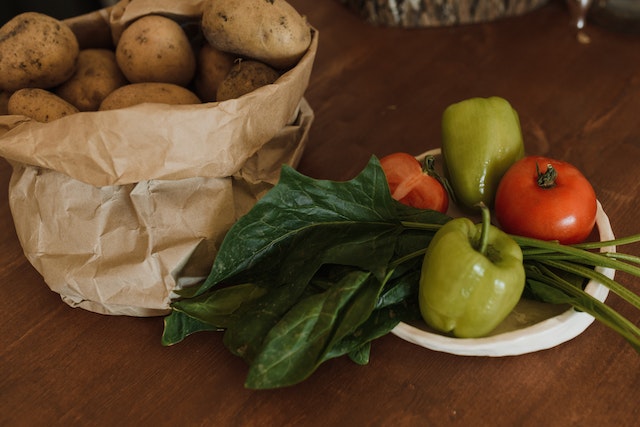
Can You Store Onions and Potatoes Together?
The ideal conditions for storing onions and potatoes are the same: cool, dark, and well-ventilated. While these two lowly vegetables appear to be a match made in gastronomic heaven, storing them together is strictly prohibited. Onions generate and exude ethylene gas, which accelerates the ripening process and may cause surrounding potatoes to rot and perish faster.
How Far Away Should Onions and Potatoes Be Stored?
Onions and potatoes should ideally be stored in different locations. This is because onions emit gases, which might cause potatoes to sprout prematurely. In that situation, keep onions and potatoes in completely separate locations, such as across the room or in a different bag, basket, box, or drawer. A short distance goes a long way toward retaining freshness! Maintain a distance of at least a few feet between them to ensure they are both in optimal conditions for their specific needs.
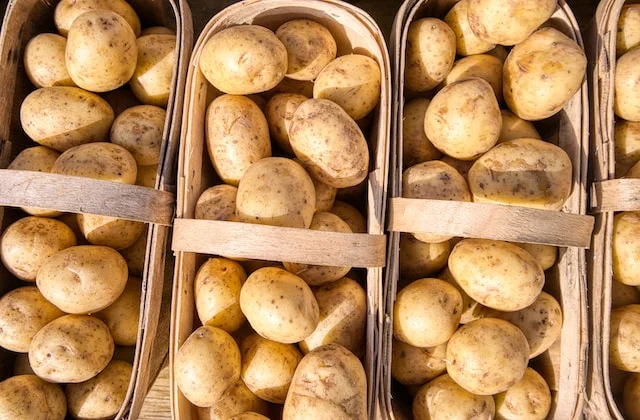
How to Store Potatoes?
When it’s cool (50 to 60°F) and dry, like in a basement, sprouting stops. Avoid plastic because moisture causes decay.
Give Them Proper Air Flow
First and foremost, potatoes require air to survive! Storing them in an airtight container or plastic bag provides a mushy, sprouty mess. Instead, choose a well-ventilated container, such as a woven basket or paper bag, which allows air to move freely.
Keep Them Out of Sunlight
Light exposure is a big no-no when it comes to potato storage. Sunlight can cause potatoes to turn green and create solanine, a poisonous chemical that can cause illness if taken in big quantities.
So, find a great, dark, cold place to store your sack of potatoes – think pantry, cellar, or even a kitchen cabinet that is out of direct sunlight. Remember: the less light they are exposed to, the better.
Keep Them Away from Moisture
Potatoes and wetness are like frenemies – they can tolerate each other for a short time, but too much closeness is a recipe for disaster. Excess humidity promotes sprouting and mold growth. To keep them fresh and healthy, store them in a dry place away from sources of humidity and condensation.
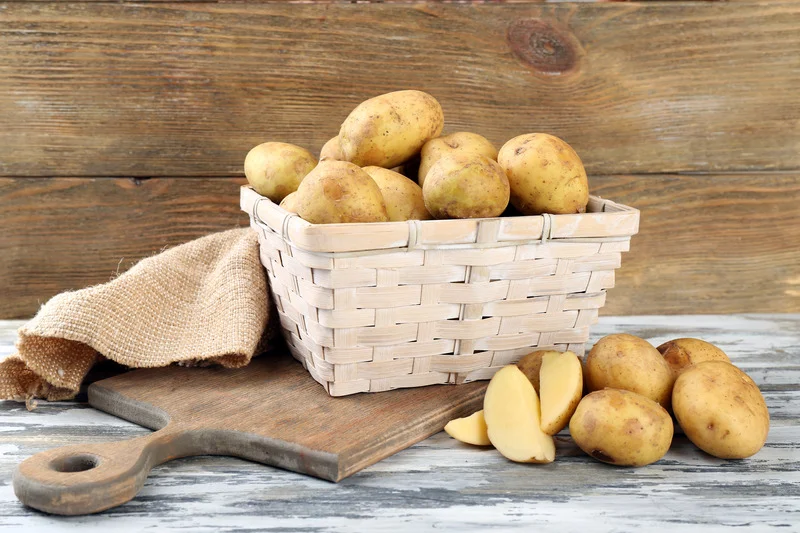
Keep Potatoes in a Cool and Dry Environment
The ideal temperature for potato storage is between 45-50°F (7-10°C). Any warmer, and those little guys will start sprouting faster than a TikTok trend. Any cooler, and you risk them developing an unappetizing flavor. A cool, dry, and dark spot like a basement or root cellar is perfect. Avoid storing potatoes in areas with direct sunlight or near sources of heat, such as ovens or radiators.
Separate Fruits and Veggies
Remember how annoying those onion gases were? Fruits can be just as problematic for your potatoes. Many release ethylene gas, which can speed up sprouting and deterioration. It is important to store potatoes apart from other fruits and vegetables, including celery, peppers, apples, bananas, and tomatoes.
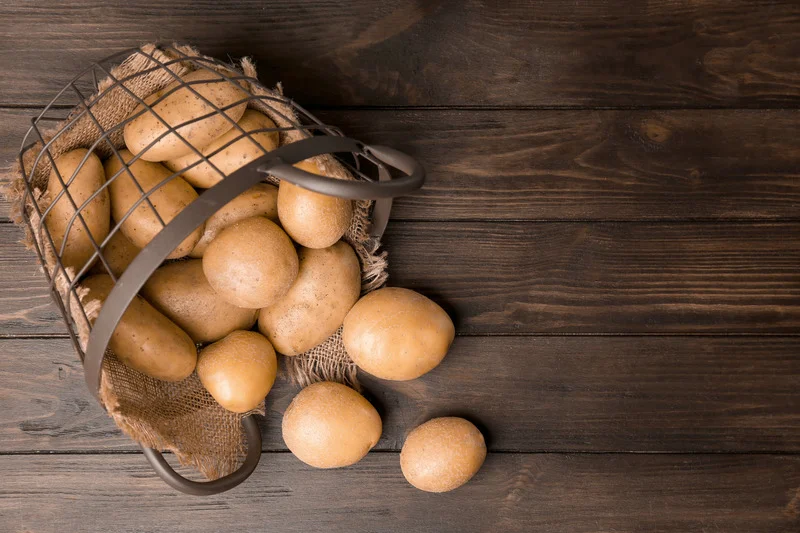
Never Store Potatoes in the Refrigerator
The Food and Drug Administration advises against storing uncooked potatoes in the fridge because the too cool temperature can result in increased acrylamide, a chemical formed from sugars and an amino acid that is naturally present in food, during cooking (via Southern Living). Plus, the damp environment of the fridge can lead to premature sprouting and softening.
How to Store Cut Potatoes?
Not all recipes need a whole bunch of potatoes, so you can store the extras. Here’s the lowdown on keeping those cut spuds fresh:
- Place the cut potato pieces in a basin or airtight container and cover with cool water. This avoids browning and drying out.
- Place the lid on the container, making sure it is airtight.
- Store the potatoes in the refrigerator.
- To maintain their crispness, drain and refresh the water every day.
- Refrigerate for up to three or four days.
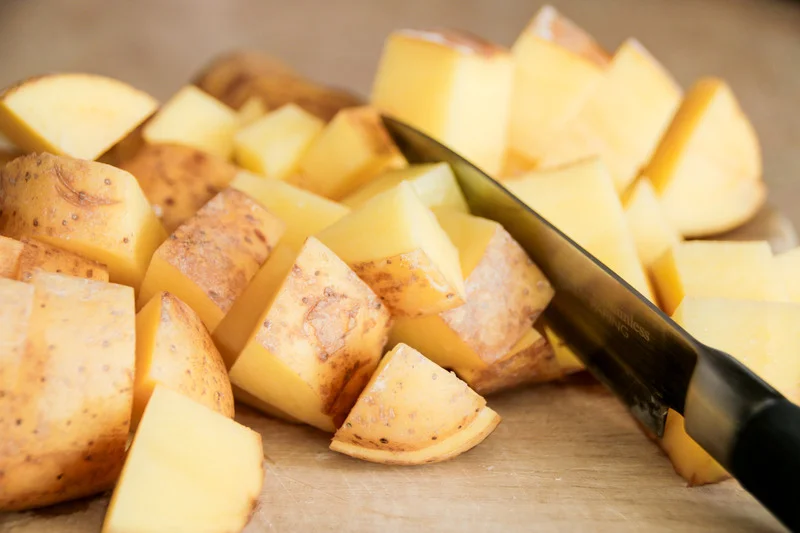
Signs Potatoes Have Gone Bad
Even with perfect storage conditions, potatoes won’t last forever. Keep an eye out for these telltale signs that it’s time to toss ’em:
- Greenish hue: This indicates the presence of solanine, a toxic compound.
- Soft, mushy texture: Potatoes should be firm and free of wrinkles or soft spots.
- Sprouts or eyes: While these aren’t necessarily harmful, they do mean your potatoes are past their prime.
- Mold or discoloration: Any signs of mold or unusual discoloration are a surefire sign it’s time to toss them.
- Rotten, off smell: If it smells funky, ditch those expired spuds.
How to Store Onions?
The ideal onion storage area is cold, dry, and dark, with plenty of air circulation. A cupboard, cabinet, or mesh basket on the countertop are all ideal options. Avoid using plastic bags or airtight containers, since they might retain moisture and cause spoiling.
Onions do best when the temperature is between 45°F and 55°F (7°C and 12°C). If they are kept too cold, they will become soft and mushy. Too warm, and they’ll sprout like there’s no tomorrow.
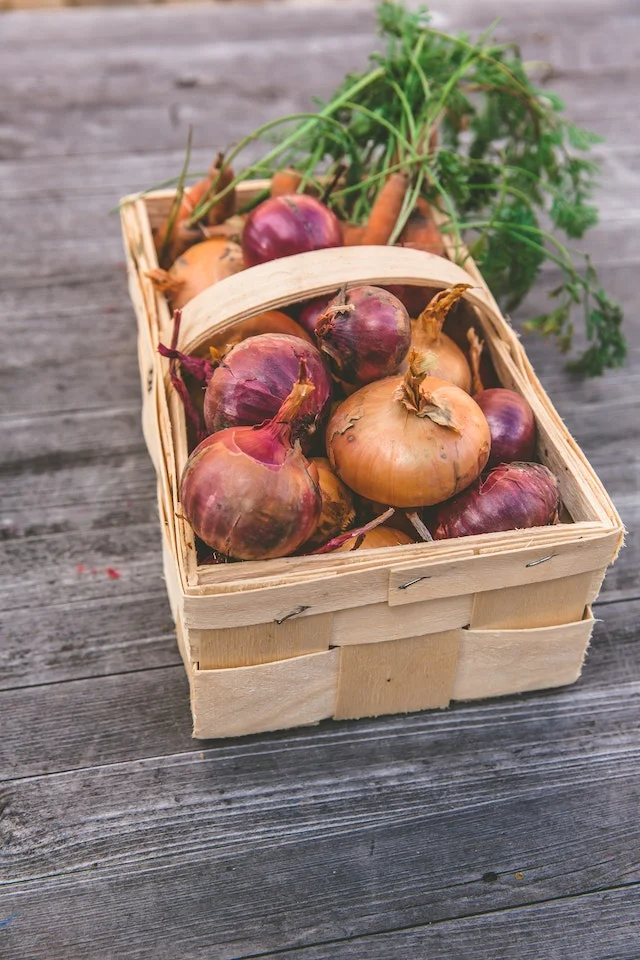
Can You Store Garlic with Onions?
One interesting fact is that onions and garlic store really well together! Onions release ethylene, while garlic isn’t affected. Because they have similar moisture and temperature preferences, they can be stored together without risk of cross-contamination or premature spoiling. To avoid undue moisture buildup, keep everything cool, dark, and well-ventilated.
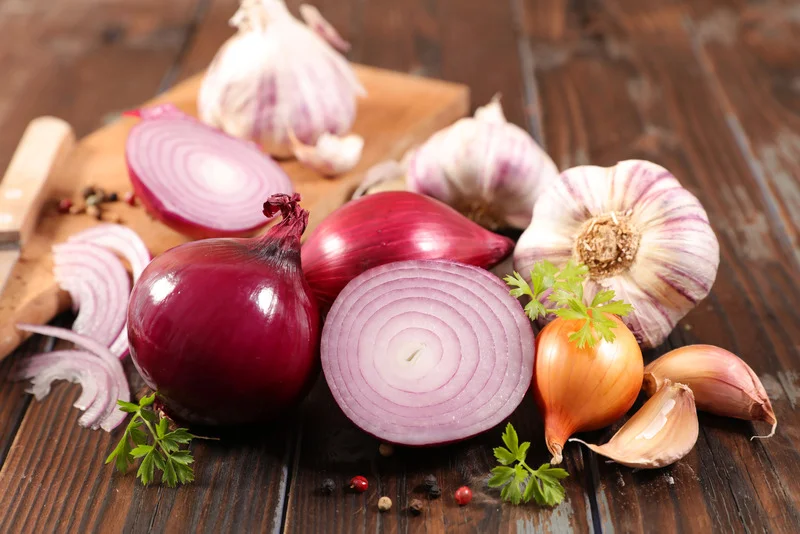
Final Thoughts
You now have the complete resource for storing onions and potatoes. By following these easy steps, you can keep the foods in your pantry fresh, flavorful, and ready to use in a wide range of tasty recipes.
No more wasted vegetables or early sprouting problems! With a little organization, you’ll be able to keep your onions and potatoes in great condition, ready to face any culinary challenge that comes your way.
FAQs about Onion and Potato Storage Ideas
A foot or two between onion and potato bags, in a well ventilated closet or other area is sufficient to allow moisture from the potatoes to dissipate. Onions can be frozen, but I don’t recommend it.
A plastic basket with open weaving (something like a small laundry basket) makes a great storage bin for potatoes. Just make sure you place the basket in a dark place, like a closet or pantry. It’s also important not to wash potatoes prior to storing them. You can wipe them off with a dry cloth or paper towel.
Ideally, onions should be stored in a cool, dark place between 45 and 55 degrees F. Whole, raw onions will last two to three months when stored in a cool, dry place.
Keep Potatoes in a Cool and Dry Environment
As previously explained, potatoes should be placed in a cardboard box, mesh bag, or basket to ensure good ventilation. Store your potatoes in a cool, dark place (45 to 50 F is the ideal temperature range), such as your pantry or unheated basement.
Sure, spuds and bulbs are tasty when combined together in meals. But when it comes to storage, they should be kept far away from one another.
Place cured potatoes in a burlap bag, tuck the bag into a plastic storage bin left open a wee bit, and keep in an unheated basement.
Sources:
- Storage for potatoes onions etc – please post you pics
- Walk-in Pantry Potato & Onion Storage?
- How to Store Onions and Potatoes
- Why You Need to Store Your Onions and Potatoes Separately
- How to Store Potatoes and Onions the Right Way
- Jeri’s Organizing & Decluttering News: Storing the Onions and Potatoes: Bins, Baskets and Bags
- Suggestions for large bins/boxes to store potatoes and onions?
- Potatoes and Onions – organizing my home in little bits 🙂
- The 7 Best Onion Storage Containers of 2024
- Why you need a potato & onion storage bin
- How to Store Potatoes the Right Way—and Prevent Them From Sprouting
- Potato and Onion storage solutions
- Can You Store Potatoes and Onions Together?
- How to Store Potatoes Ideas & Tips
- How to Store Potatoes So They Last for Months (Yes, Months)
- How to Store Potatoes and Onions